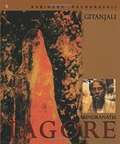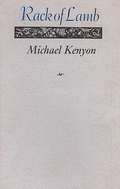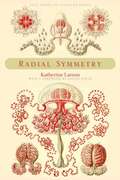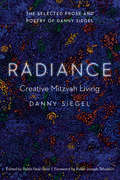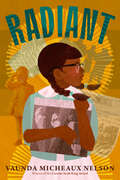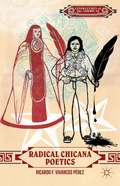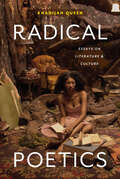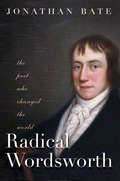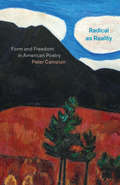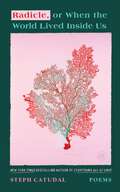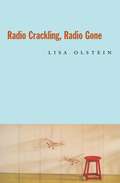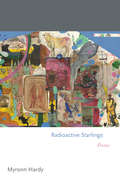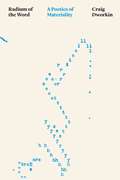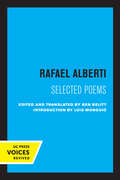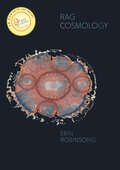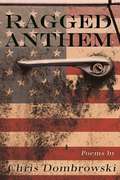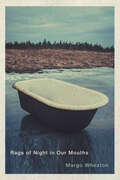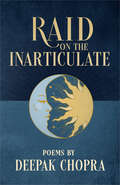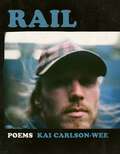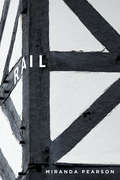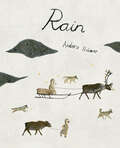- Table View
- List View
Rabindra Rachnavali: Gitanjali
by Rabindranath TagoreThis book contains the English translation of various poems and works of the legendary Indian poet Shri Rabindranath Tagore,translated by Tagore himself.
Rack of Lamb
by Michael KenyonMichael Kenyon's Rack of Lamb is a compelling study in voice. Organized loosely around various foods, the book brings together the voices of several women and a young girl, all from the same community but representing various social and cultural groups, subtly but powerfully joined by major social and political events. The power in Kenyon's book, however, lies not only in his uncanny ability to articulate strongly developed characters in one or two brief passages, but also in his ability to evoke a re-examination of the relationship between the individual, the mundane and the worldly.
Radial Symmetry
by Katherine LarsonKatherine Larson is the winner of the 2010 Yale Series of Younger Poets Competition. With Radial Symmetry, she has created a transcendent body of poems that flourish in the liminal spaces that separate scientific inquiry from empathic knowledge, astute observation from sublime witness. Larson's inventive lyrics lead the reader through vertiginous landscapes--geographical, phenomenological, psychological--while always remaining attendant to the speaker's own fragile, creaturely self. An experienced research scientist and field ecologist, Larson dazzles with these sensuous and sophisticated poems, grappling with the powers of poetic imagination as well as the frightful realization of the human capacity for ecological destruction. The result is a profoundly moving collection: eloquent in its lament and celebration. Metamorphosis [excerpt] We dredge the stream with soup strainers and separate dragonfly and damselfly nymphs- their eyes like inky bulbs, jaws snapping at the light as if the world was full of tiny traps, each hairpin mechanism tripped for transformation. Such a ricochet of appetites insisting life, life, life against the watery dark, the tuberous reeds.
Radiance: Creative Mitzvah Living
by Danny SiegelThe Selected Prose and Poetry of Danny Siegel This first anthology of the most important writings by Danny Siegel, spanning and renewing fifty years of his insights intersperses soulful Jewish texts with innovative Mitzvah ideas to rouse individuals and communities to transform our lives, communities, neighborhoods, and world. As a renowned teacher Siegel describes the creative—often startling—ways individuals from different walks of life have brought compassion into the world, recognizes them as Mitzvah heroes, and suggests how we can apply their life lessons. He also plumbs how giving enriches living and presents Jewishly informed best principles for doing more world repair (Tikkun Olam). As a scholar of rabbinic literature Siegel offers translations and commentaries on Jewish texts illuminating Tzedakah, values, caring, and leadership. In addition he tops off a half-century of his thought with five new essays reflecting on his visions for a better world. The selected poetry asks religious and theological questions in the face of oppression and war, gives voice to personal moments often neglected by ritual, and exults at the wonders of modern Israel and the revelation of love. Both inspirational and pragmatic, this anthology offers practical guidance on using Siegel&’s classic and novel works in personal living and in Jewish organizational settings. Ultimately, in exploring the dynamic interaction between heroes, texts, and ourselves, Siegel seeks to engage each of us in discovering our own radiant potential for creative Mitzvah living.
Radiant
by Vaunda Micheaux NelsonA historical middle-grade novel in verse from multiple Coretta Scott King winner Vaunda Micheaux Nelson.As school begins in 1963, Cooper Dale wrestles with what it means to &“shine&” for a black girl in a predominantly white community near Pittsburgh. Set against the historic backdrop of the Birmingham church bombing, the Kennedy assassination, and Beatlemania, Radiant is a finely crafted novel in verse about race, class, faith, and finding your place in a loving family and a complicated world. Cooper&’s primary concern is navigating fifth grade, where she faces both an extra-strict teacher and the bullying of Wade Carter, the only child of a well-to-do white family, whose home Cooper&’s mother cleans for extra income. How can she shine when her mother works for the meanest boy in school? To make matters worse, Cooper quietly wishes she could be someone else.It&’s not all bad, though. Cooper and her beloved older sister have fallen for the Beatles, and Cooper is thrilled to have something special they can share. And what she learns about her British idols adds new complexity to Cooper&’s feelings about race.
Radical Chicana Poetics (Literatures of the Americas)
by Ricardo F. Vivancos PérezIn This Bridge Called My Back, Gloria Anzaldúa wrote: "A woman who writes has power. A woman who writes is feared. In the eyes of the world this makes us dangerous beasts." Her statement marked a moment of collective self-recognition. Radical Chicana Poetics considers this moment as a point of entry into Chicana writings. By offering a comparative analysis of works by Anzaldúa, Cherríe Moraga, Ana Castillo, Emma Pérez, Alicia Gaspar de Alba, and Sandra Cisneros, this book elucidates the subtle differences among them in relation to contemporary cultural production and feminist activism. Additionally, this book addresses questions of positionality and ethics for the Chicana studies scholar.
Radical Poetics: Essays on Literature & Culture (Poets On Poetry)
by Khadijah QueenLiterature has the power to help build a shelter in language for a way of being that holds integrity and love as its root. In the tradition of Audre Lorde, Angela Davis, and many other Black writers and theorists, poet and professor Khadijah Queen observes questions of life and literature, human feeling and behavior, and explores language-based solutions to common cultural conflicts that are often rooted in harmful assumptions. Instead of operating from a base of unquestioned thought and systemic tradition, Radical Poetics presents more inclusive and accurate ways of contemplating literary work. Building on ideas and theoretical practices from Édouard Glissant, Toni Morrison, bell hooks, Saidiya Hartman, and Kimberlé Crenshaw, Queen reads for where love is present as well as for where it is absent—tracing systems of thought and aesthetic choices to track how characters are portrayed in terms of race, gender, class, and disability. She analyzes short stories, novels, nonfiction narratives, poetry, and a play from authors such as Herman Melville, Kate Chopin, Dionne Brand, Frances Ellen Watkins Harper, Ma-ka-tai-me-she-kia-kiak, Sor Juana Inés de la Cruz, Natasha Trethewey, and Muriel Rukeyser. Queen’s essays offer shifts in thinking about language—beyond calling out the ways language punishes vulnerability, entrenches harm, and suppresses true intercultural communication. Her intuitive approach aims to correct inaccuracies that have served as a foundation for the discriminatory thinking that undergirds American institutions and culture, particularly the continued glorification of violence. Radical Poetics makes a case for the imperative and practical value of understanding poetics beyond artistic and academic spaces and into everyday life.
Radical Wordsworth: The Poet Who Changed the World
by Jonathan BateOn the 250th anniversary of Wordsworth&’s birth comes a highly imaginative and vivid portrait of a revolutionary poet who embodied the spirit of his age Published in time for the 250th anniversary of William Wordsworth&’s birth, this is the biography of a great poetic genius, a revolutionary who changed the world. Wordsworth rejoiced in the French Revolution and played a central role in the cultural upheaval that we call the Romantic Revolution. He and his fellow Romantics changed forever the way we think about childhood, the sense of the self, our connection to the natural environment, and the purpose of poetry. But his was also a revolutionary life in the old sense of the word, insofar as his art was of memory, the return of the past, the circling back to childhood and youth. This beautifully written biography is purposefully fragmentary, momentary, and selective, opening up what Wordsworth called "the hiding-places of my power."
Radical as Reality: Form and Freedom in American Poetry
by Peter CampionWhat do American poets mean when they talk about freedom? How can form help us understand questions about what shapes we want to give our poetic lives, and how much power we have to choose those shapes? For that matter, what do we even mean by we? In this collection of essays, Peter Campion gathers his thoughts on these questions and more to form an evolutionary history of the past century of American poetry. Through close readings of the great modernists, midcentury objectivists, late twentieth-century poets, his contemporaries, and more, Campion unearths an American poetic landscape that is subtler and more varied than most critics have allowed. He discovers commonalities among poets considered opposites, dramatizes how form and history are mutually entailing, and explores how the conventions of poetry, its inheritance, and its inventions sprang from the tensions of ordinary life. At its core, this is a book about poetic making, one that reveals how the best poets not only receive but understand and adapt what comes before them, reinterpreting the history of their art to create work that is, indeed, radical as reality.
Radicle, or When the World Lived Inside Us: Poems
by Stephanie CatudalFrom the New York Times bestselling author Everything All at Once comes a beautiful poetry collection exploring motherhood, grief, the unending road to healing, and the redeeming power of love.The word radicle is defined as the root of a plant embryo, the first organ to appear when a seed germinates. It grows downward into the soil, anchoring the seedling, a symbol of growth and grounding.Steph Catudal is beloved for her poignant meditations on loss, uncertainty, and illness, and the raw, wise reflections of her “brilliant, unflinching, lyrical” (Matt Haig) New York Times bestselling memoir Everything All At Once.Now, Catudal brings her trademark wisdom and strong lyrical voice to bear in her first collection of verse, delving into the challenging yet often rich parts of life people often lack the courage to face. Radicle, or When the World Lived Inside Us explores universal themes of motherhood, our relationship to the natural world, the nature of suffering, the circular process of healing, and what it means to stay present in the midst of it all.Loving myself has been like watching starlings nest: braving the elements for a chance to witness some part of me live on, gathering twigs and twine for the promise of future, to reach for my own hand, fire and all, and say good girl, good girl it's time to come home.
Radio Crackling, Radio Gone
by Lisa OlsteinWinner of the Hayden Carruth Award Radio Crackling, Radio Gone is a debut collection of poetry that explores multiple logics of perception, association, and interpretation. Navigating the edges where things begin to disappear, the poems inhabit border zones of transformation where memory slides into imagination, wakefulness meets sleep, and things possessed become lost. What seemed a mystery wasin fact a choice. Insert bird for sorrow.What seemed a memory was in facta dividing line. Insert bird for wind.Insert wind for departure when everyoneis standing still. . .Radio Crackling, Radio Gone was selected from the 1,200 submissions to the Hayden Carruth Award. By the time the anonymous manuscript was chosen as winner, the cover sheet was filled with readers' commentary: "stunning" and "lovely" and a bold "YES!"
Radioactive Starlings: Poems
by Myronn HardyFrom an award-winning poet, a collection that explores the complexities of transformation, cultures, and politicsIn Radioactive Starlings, award-winning poet Myronn Hardy explores the divergences between the natural world and technology, asking what progress means when it destroys the places that sustain us. Primarily set in North Africa and the Middle East, but making frequent reference to the poet’s native United States, these poems reflect on loss, beauty, and dissent, as well as memory and the contemporary world’s relationship to the collective past.Hardy imagines the Portuguese writer Fernando Pessoa as various starlings dwelling in New York City, Lisbon, Tunis, and Johannesburg, flying above these cities, resting in ficus and sycamores and on church steeples and minarets. Inhabiting the invented voices of Gwendolyn Brooks, Bob Kaufman, and Henry Ossawa Tanner, the poems make references to Miles Davis, Mahmoud Darwish, Tamir Rice, Ahmed Mohamed, and Albert Camus, and use forms such as ghazal, villanelle, pantoum, and sonnet, in addition to free lyricism. Through all these voices and forms, the questing starlings persist, moving and observing—and being observed by we who are planted on a crumbling ground.A meditation on the complexities of transformation, cultures, and politics, Radioactive Starlings is an important collection from a highly accomplished young poet.
Radium of the Word: A Poetics of Materiality (Thinking Literature)
by Craig DworkinWith fresh insight and contemporary relevance, Radium of the Word argues that a study of the form of language yields meanings otherwise inaccessible through ordinary reading strategies. Attending to the forms of words rather than to their denotations, Craig Dworkin traces hidden networks across the surface of texts, examining how typography, and even individual letters and marks of punctuation, can reveal patterns that are significant without being symbolic—fully meaningful without communicating any preordained message.Radium of the Word takes its title from Mina Loy’s poem for Gertrude Stein, which hails her as the Madame “Curie / of the laboratory / of vocabulary.” In this spirit, Dworkin considers prose as a dynamic literary form, characterized by experimentation. Dworkin draws on examples from writers as diverse as Lyn Hejinian, William Faulkner, and Joseph Roth. He takes up the status of the proper name in Modernism, with examples from Stein, Loy, and Guillaume Apollinaire, and he offers in-depth analyses of individual authors from the counter-canon of the avant-garde, including P. Inman, Russell Atkins, N. H. Pritchard, and Andy Warhol. The result is an inspiring intervention in contemporary poetics.
Rafael Alberti: Selected Poems
by Rafael AlbertiThis title is part of UC Press's Voices Revived program, which commemorates University of California Press’s mission to seek out and cultivate the brightest minds and give them voice, reach, and impact. Drawing on a backlist dating to 1893, Voices Revived makes high-quality, peer-reviewed scholarship accessible once again using print-on-demand technology. This title was originally published in 1966.
Rag Cosmology
by Erin RobinsongWinner of the 2017 A.M. Klein Prize for Poetry BookThug is proud to introduce a groundbreaking debut collection of poems by Erin Robinsong. In this time of ecological precarity, Rag Cosmology is an urgent invitation to reinvent our modes engagement with the environment we not only inhabit, but are. Refusing the lamentation that leaves us as resigned witnesses to devastation, Rag Cosmology counters fatalist narratives with the pleasures of ecological entanglement and engagement. Tracing relationships between seemingly irreconcilable things--economy and ecology, weather and lust, bills and inner voices, wages of avoidance and wages of listening--Rag Cosmology offers the intimate and lush language of thought that yearns for an imaginative reinvention of how we understand what we are part of and what we are losing.
Rag Virag Ek Vivechan: राग-विराग एक विवेचन
by Dr Ramvilas Sharma'राग-विराग' निराला की 130 महत्त्वपूर्ण एवं सर्वश्रेष्ठ कविताओं का प्रामाणिक संकलन है, जिसे हिंदी साहित्य के सुविख्यात विद्वान् डॉ. रामविलास शर्मा ने संकलित एवं संपादित किया है। निश्चय ही यह संकलन निराला के संपूर्ण काव्य-साहित्य का प्रतिनिधित्व करता है। प्रस्तुत पुस्तक 'राग-विराग: एक विवेचन' में इन्हीं कविताओं की सर्वांगीण समीक्षा व विशद व्याख्या प्रस्तुत की गई है। 'राग-विराग: एक विवेचन' नाम्नी प्रस्तुत पुस्तक दो भागों में विभक्त है- आलोचना भाग व व्याख्या भाग। 'आलोचना भाग' में निराला से संबद्ध सभी महत्त्वपूर्ण विषयों पर वैज्ञानिक ढंग से शोधपूर्ण विवेचन प्रस्तुत किया गया है। साथ ही उनकी तीन कालजयी कविताओं से संबंधित समीक्षात्मक विषयों का भी समावेश किया गया है। 'व्याख्या भाग' में विभिन्न विश्व विद्यालयों के पाठ्यक्रम में निर्धारित कविताओं की प्रामाणिक व्याख्या प्रस्तुत की गई है। प्रस्तुत संशोधित/परिवर्धित संस्करण में पुस्तक को और अधिक उपयोगी बनाने की चेष्टा की गई है।
Ragged Anthem (Made in Michigan Writers Series)
by Chris DombrowskiRagged Anthem displays the same inimitable voice and unflinching gaze that made Chris Dombrowski a Poetry Foundation bestseller and silver medal winner of Foreword Reviews’ Book of the Year Award in poetry. His work has been celebrated by renowned writers such as Jim Harrison and Alicia Ostriker, who have called his books (respectively) "extraordinarily powerful and graceful" and "one of the most beautiful books of poetry I’ve read in years." As in Dombrowski’s previous books, in Ragged Anthem the natural world is as alive and as fully realized as language allows. His comfort with the naming of the world, combined with a life lived intimately with the other species that populate the landscape of home, suggest an authenticity that few can claim. Ragged Anthem is a demonstration in continued poetic growth and expanded terrain. Written from the speaker’s midlife, the poems delve into the transformation of family, childhood tragedies, and politics. Dombrowski lifts the veil on the imbecilic bureaucracies—those on Capitol Hill and in the faculty meetings occurring in our own conference rooms—that often help to whittle our fates. The book contains well-placed and evocative allusions to such figures as American painter Mark Rothko and Saint Francis of Assisi, as well as the periodic highlighting of language from contemporary song lyrics. These "borrowings" set forth a conversation between the poet and other artists that evoke the original source while transforming it into something new, proving that words, although artifice, live within our bodies, changing our relationship to place. Ragged Anthem makes a powerful and important contribution to contemporary poetry. Fans of Dombrowski’s past works and newcomers alike will bask in the poet’s firm yet relaxed approach to the shaping of language.
Ragged Robin: Poems from A to Z
by James ReevesWith wit and humor, Reeves romps through the alphabet with blacksmiths and town criers, candlelit castles and woods in words. This is a delightful collection of poems to read aloud. Other books by this English poet are available in this library.
Raghuvansh
by Kalidasa Deviratna AvasthiThis is the best among the poems of Kalidasa. In this poetry Kalidasa gives the history from King Dilip to Agnivarna.
Rags of Night in Our Mouths (Hugh MacLennan Poetry Series)
by Margo WheatonSilence in the belly of the breathing house. Night so deep / it’s reaching through rooms as if searching its pockets.Standing in the midst of her childhood home, Margo Wheaton was struck by two things: the extent of the damage caused by her father’s and stepmother’s alcoholism and the life force that pulsed in the once-vibrant rooms and yard – in the abandoned trees, neglected flowerbeds, and gardens her parents had planted and tended for decades.Radiant, grieving, and intensely musical, Rags of Night in Our Mouths is an exploration of human and environmental states of precarity and vulnerability. In the opening suite, Wheaton draws upon her family’s deep roots in the Tantramar Marsh area and constructs a hallucinatory world of fragility, chaos, and searing natural beauty as she writes her own version of Maritime gothic. Employing a variation of the ghazal, a historically Persian form popularized in Canada by the late New Brunswick–based poet John Thompson, she surveys the ruins of her working-class childhood home, a thriving place now ravaged by generational alcoholism and despair. Directed at first toward an absent beloved – a convention of the ghazal tradition – the focus moves in the second suite to the teeming, non-human world of an endangered saltmarsh on a wild shore of the Northumberland Strait bordering Nova Scotia, New Brunswick, and Prince Edward Island. In the book’s closing suite, Wheaton honours a landscape slated to be destroyed and pays homage to “the broken-hearted, the bereaved” who walk the ragged shoreline, struggling to make sense of losses and death.Meditative and beautifully crafted, Rags of Night in Our Mouths calls us to engage passionately with our suffering world.
Raid on the Inarticulate
by Deepak ChopraA book of poems by bestselling author Deepak Chopra that are deeply spiritual, heartfelt, and touch on topics like God, love, surrender, shadow, and peace.Poetry is the language of the soul, according to Deepak Chopra, and in RAID ON THE INARTICULATE, he shares a collection of poems that, in his words, can very elegantly show us the truth of paradox and ambiguity. Poetry can be a source of awakening and revelation, and the poems in this book focus on conundrums, existential dilemmas, and consciousness; they're about love, peace, the timelessness of the mind, freedom, surrender, God, and the journey to the self.
Rail (A Poulin, Jr. New Poets of America #41)
by Kai Carlson-WeeSet against a landscape of rail yards and skate parks, Kai Carlson-Wee’s debut collection captures a spiritual journey of wanderlust, depression, brotherhood, and survival. These poems—a “verse novella” in documentary form—build momentum as they travel across the stark landscapes of the American West: hopping trains through dusty prairie towns, swapping stories with mystics and outlaws, skirting the edges of mountains and ridges, heading ever westward to find meaning in the remnants of a ruined Romantic ideal. Part cowboy poet, part prophet, Carlson-Wee finds beauty in the grit and kinship among strangers along the road.
Rail (Hugh MacLennan Poetry Series #43)
by Miranda PearsonTracks and ley-lines pull us, carry us / past Lindisfarne - or an imagined glimpse / drifting holy in the distance, / another reality running through it. A rail is a track, a support, and a barrier. In this collection, spanning the personal and the political, Kentish pathways lead to London, to Yorkshire, to Faroe, then circle back to the west coast of Canada. An appeal, a railing against, these poems reach for beauty and compassion amidst uneasy global upheaval. Miranda Pearson considers family ties and threads between adult and child, cross-pollinating and subverting credos from Bloomsbury to Brexit, Whitechapel to West Vancouver, the Bible to punk. The long poem "Abacus" explores dyscalculia and ways that numbers and their associations can be a rich source of memory. It also delves into resulting anxieties - navigations and compensations made in response to a learning difference. Through imagery heavily influenced by visual art, other poems in Rail focus on geological elements: how parts fit and dislodge, erode and compress. Ceramics and gemstones, ice and rock are fault lines and stepping stones that act as envoys between the human and the natural world. A tension exists here between art and nature, between art objects and the violent history of colonial curation. Rail tracks the cascade of this duality. Exploring a diasporic connection between England and Canada, Rail is a journey along the brink between high and low culture, balancing on the edge of the awkward and the elegant.
Rail (Hugh MacLennan Poetry Series #50)
by Miranda PearsonTracks and ley-lines pull us, carry us / past Lindisfarne – or an imagined glimpse / drifting holy in the distance, / another reality running through it. A rail is a track, a support, and a barrier. In this collection, spanning the personal and the political, Kentish pathways lead to London, to Yorkshire, to Faroe, then circle back to the west coast of Canada. An appeal, a railing against, these poems reach for beauty and compassion amidst uneasy global upheaval. Miranda Pearson considers family ties and threads between adult and child, cross-pollinating and subverting credos from Bloomsbury to Brexit, Whitechapel to West Vancouver, the Bible to punk. The long poem "Abacus" explores dyscalculia and ways that numbers and their associations can be a rich source of memory. It also delves into resulting anxieties – navigations and compensations made in response to a learning difference. Through imagery heavily influenced by visual art, other poems in Rail focus on geological elements: how parts fit and dislodge, erode and compress. Ceramics and gemstones, ice and rock are fault lines and stepping stones that act as envoys between the human and the natural world. A tension exists here between art and nature, between art objects and the violent history of colonial curation. Rail tracks the cascade of this duality. Exploring a diasporic connection between England and Canada, Rail is a journey along the brink between high and low culture, balancing on the edge of the awkward and the elegant.
Rain
by Anders HolmerA poetry collection celebrating the wonders of the natural world This haiku collection will enchant both nature lovers and budding poets. The spare, lyrical text describes a series of short vignettes, each of them taking place in a different kind of rain, from thunderstorms to falling flower petals. The poems—some serious, some gently humorous—depict scenes from all over the globe: a horse struggling to plow a field, a father changing a tire while his children play, and two friends making up after a fight. With its majestic artwork, this introduction to a classic poetic form will inspire readers to write their own haiku as they experience the amazing world around them.
